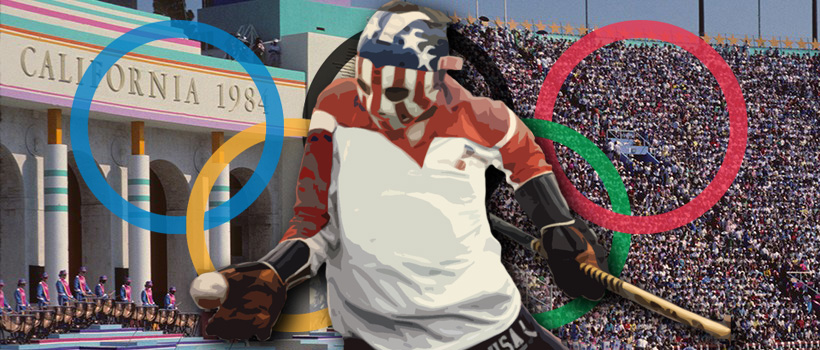
“I can still remember the moment. The United States entered the Olympic Stadium, and we hear this chant: ‘USA, USA.’ It was an amazing feeling,” says Diane Moyer, Ph.D. Now a professor of psychology at Cedar Crest College, Moyer competed in the 1984 Summer Olympics in Los Angeles, CA. There, she earned a bronze medal as a member of the United States Olympic field hockey team. During the Tokyo 2020 Summer Olympics, we caught up with Moyer to learn about her time at the Olympic games, her journey to Cedar Crest and her advice for athletes today.
After picking up field hockey in high school Moyer went on to La Salle University with a scholarship for basketball. Moyer played basketball, softball and field hockey and was a member of the swimming and diving teams in college until she began to focus on field hockey at an elite level.
Moyer traveled across the country and the world playing on the United States Women’s National Field Hockey Team from 1978 to 1984. She competed in world cup championships and qualified for the Olympic team, planning to compete in the 1980 Olympics before the United States boycotted the games. Moyer made her Olympic appearance at the 1984 games in Los Angeles. After training and competing all over the world, coming home to United States to compete at the highest level was an unforgettable experience and the culmination of the team’s hard work.
The games, she says, were the “experience of a lifetime”
The team worked hard to be one of just six women’s field hockey teams to qualify that year. Though Moyer felt an initial disappointment not to be traveling to a foreign country for the games, the moment she walked into the stadium during the opening ceremony she knew that the support of a home crowd would be a special experience.
“I can still remember the feeling of walking into the opening ceremonies, standing shoulder to shoulder with my teammates and just realizing what we had accomplished just to get there. And the fact that we were about to experience something great competing in the Olympics. It was an amazing feeling.”
Moyer’s team went on to win a bronze medal after a shootout with Australia (10–5) to claim America’s first Olympic medal in women’s field hockey. For a sport with little recognition in the states, the US team was brought into the spotlight.
“I’ll never forget standing on the podium receiving our medal… The flags were raised and the trumpets we’re playing, and the medals were hung around our necks, and we turn around to the different sections of the stadium and wave with pride and joy and triumph. It was a moment that I realized what we had done and it kind of took my breath away.”
After the Olympics, Moyer went on to coach field hockey as well as basketball and lacrosse at several institutions including Yale, Villanova and Hollins University. She went on to earn a master’s degree in sports management from the University of Massachusetts, a master’s degree in counseling psychology from the University of Pennsylvania and a doctorate in psychology from Temple University.
“I didn’t know what I was going to do after college,” she says. “I just followed my heart and my passion for psychology and athletics and here I am today. I have always loved what I do.”
Moyer has been a professor in the College’s Department of Psychology since 1996, and, in April 2021, she was recognized for 26 years of service to the College at Cedar Crest’s Promotion and Tenure Ceremony. She is a Licensed Psychologist and received specialized training in working with children and adolescents at the Children’s Hospital in Columbus, OH. She holds memberships in the American Psychological Association, and the American Counseling Association and has published in several journals. In 2019, Moyer was inducted into the Pennsylvania Sports Hall of Fame.
After reflecting on her own journey, “I encourage students to just follow their passion and curiosity, which could open up a whole new world and maybe lead them to discover something completely different, new and fascinating.”
To current student-athletes, Moyer says, “Competing in college is a wonderful experience. I want [you] to enjoy it as much as [you] can. What really is so meaningful is the memories of the journey that [you’re] going to cherish for [your] lifetime. Just enjoy the bonds that [you’re] forming and be proud of [your] accomplishments.”